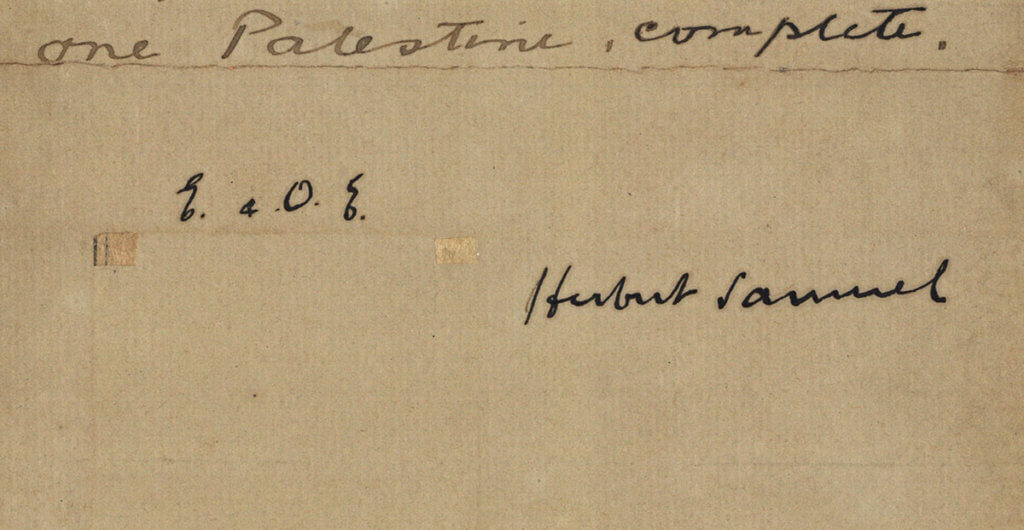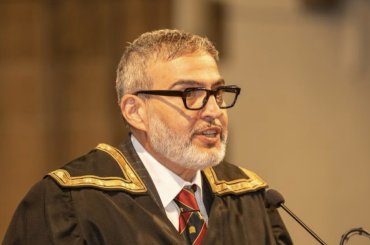Exactly 100 years ago today, June 30, 1920, the last day of British Military rule of Palestine, Major General Sir Louis Bols handed custodianship of the territory to a civilian administration under Palestine’s first High Commissioner, Sir Herbert Samuel, who had arrived in Palestine ten days earlier.
As Chief Administrator under military rule, Bols’s charge had been to govern Palestine according to the laws of Occupied Enemy Territory (OETA), which state that the status quo of the land must not be altered. But he complained of being frustrated in this responsibility by Zionist aspirations. “It is no use,” he said, to tell the Christian and Moslem natives of the land that this has been observed, because “facts witness otherwise.” Despite their denials, the Zionists “will be satisfied with nothing less than a Jewish State and all that it politically implies.”

And so Bols’s imminent departure was a relief for the Zionist leadership, in particular Chaim Weizmann. Indeed, Weizmann bragged of his own role in the appointment of Herbert Samuel as Bols’s civilian replacement. For Zionism’s messianic world view, Samuel was more than just a proven advocate for the cause — he was, as the Jewish Virtual Library put it, “the first Jew to govern in the Land of Israel in 2,000 years.”
As he left, Bols engaged in a colonial prank: before handing Palestine over to Samuel, he issued a receipt for the goods.
“Received from Major General Sir Louis Bols, one Palestine, complete,” he wrote on official stationery embossed with the seal of Great Britain.
The receipt is “one of the most quoted documents in Zionist history,” as Tom Segev notes in his book “One Palestine, Complete.”
What inspired Bols to add the word “complete”? A reasonable guess, given that Bols had warned of the troubles awaiting Palestine if Weizmann in particular had his way, is that “complete” meant Samuel could not cherry-pick the merchandise. He had to take the whole thing, which was 90% passionately anti-Zionist.
Samuel signed it — but only, it appears, after adding a disclaimer used in business transactions to limit liability: E. & O.E., “errors and omissions excepted.”

One may notice three oddities about the way “complete” is written (see illustration). It is in the black ink used by Samuel; it is oddly spaced with respect to the punctuation; and the word is not on the same plane as the preceding two words.
My interpretation is that there was more ritual to their prank than first appears. As I see it, Bols writes the date and the first nine words, stops at “Palestine,” adds a comma, long space, and a period. Then he takes Samuel’s pen and with mock deliberateness writes “complete” in the space he left blank.
He hands the pen and receipt to Samuel, who plays along with the gag by adding E. & O.E., and signs it.

Whatever actually transpired, the British Mandate effectively began that midnight (though not legally until 1922). The day after that, July 2, Samuel was received in Jaffa with a thirty-one gun salute, and soon took up residence on Jerusalem’s Mount of Olives in a palace built by Kaiser Wilhelm of Germany.
In 1960, Bols’s “bill-of-sale” for Palestine was purchased at auction for $5,500 and went to Hebrew Union College’s Klau Library in Cincinnati. Learning of the extraordinary price, Samuel, then 97, expressed outrage. The receipt was “a joke,” he told reporters, and one which, according to the New York Times, he signed “after protest.” (The document sold that day and illustrated here is not the one commonly quoted. The one normally cited online and by Tom Segev in his book is slightly different, as it has the title K.C.B. and a dash after Bols’s name. There exists, it seems, another copy. But where is it?)
As today, June 30, 2020, marks one hundred years since Samuel’s signature symbolically transferred stewardship of Palestine from one non-owner to another, the document’s odd word “complete” is ever more prescient: Tomorrow, July 1, 2020, Israel threatens to formally annex more of Palestine toward its ever-constant end-game: One Israel, complete.
Yet this newest altering of the status quo of occupied land can only expedite the ultimate and inevitable irony of Bols’s century-old prank: the day when Palestine is again “one” — and complete.
My thanks to Ghada Karmi, with whom a socially-distanced conversation in her garden first piqued my further interest in the document. Tom Segev, for his helpful reply to my email inquiry. And Dr. Jordan Finkin of the Klau Library, who kindly supplied me with a high resolution image of the document that was greatly helpful. The Library’s page on the document is here.
Sources consulted and quoted
- The Klau Library, Hebrew Union College, for the original document used here.
- Jewish Telegraphic Agency, March 4, 1960, regarding the 1960 auction sale
- J.M.N. Jeffries, Palestine The Reality, p368, 333, 359, for the quotes of Louis Bols, the boasts of Weizmann in the selection of Samuel, and general contemporary reporting about the surrounding events
- While Bols’s signature does not appear on the document, in his “Memoirs,” Samuel states that Bols “wanted me to sign” the receipt. “He had a fund of humor which gave rise on this occasion to a little incident at the end of our conversation that has found its way into print,” Samuel wrote.
- Ilan Pappe, A History of Modern Palestine, p 67, regarding Samuel assisting Weizmann with his “propaganda campaign”
- New York Times, July 4, 1920 (“Samuel in Palestine”) for Samuel in Jaffa
- New York Times, July 5, 1920 (“Samuel in Jerusalem”) for Samuel in Jerusalem
- New York Times, March 3 1960 (“Chit for Nation Sold”) regarding the 1960 auction and the reference that Samuel “signed it after protest”
- Tom Segev, One Palestine, Complete, Kindle Edition, ch 7, at location 2970, where he references the incident, and endnote 36, describing Bols’ reaction to the auction sale, in turn referencing “Samuel to Turner, 5 Dec. 1959 and 16 Mar. 1960. ISA P/1 650/35”
- Tom Segev, email correspondence with the author, June 2020, inquiring about the apparent existence of two copies and that the one he cites is not the “known” copy



I don’t think Bols’ action was in the least facetious. The British military had opposed the Balfour Decl, because it greatly complicated their task of governing Palestine. Their administration was as Tom notes obligated not to alter the status quo, which infuriated the Zionists, resulting in strenuous Zionist protests and lobbying in Palestine and London, delegations to Palestine, the replacement of military governors, and general friction at the top of the British Empire. Sahar Huneidi details this in her book “A Broken Trust: Herbert Samuel, Zionism and the Palestinians,”, now out of print alas. I think Bols saw very clearly what was to come and on the last day of his tenure he was determined to impress on Samuel his responsibilities, and refused to vacate unless Samuel signed.
The creation of a civil administration by the British was legally dubious, as Palestine was still occupied Ottoman territory; the treaty that finally settled its status was not signed until 1924 or so. The civil admin had been imposed due to Zionist pressure as a means of getting their project started. Samuel proceeded to implement Zionism with gusto, even as he complained to the Colonial Office of the illegality of his admin.
Tom mentions J M N Jeffries Palestine: The Reality, an excellent contemporary source on these events Another is his reporting from Palestine for the Daily Mail, which included the text of the Hussein-McMahon correspondence showing the British promise of Palestine to the future Arab state, as the controversy over the Balfour Declaration arose in Britain
https://www.palestine-studies.org/en/node/430643
Excellent article!!
It brings to mind duplicitous Haim Weizmann:
Britain sent a delegation led by Weizmann to meet with the Arabs to allay their concerns regarding the Balfour Declaration and Zionist designs on Palestine. In June 1918, he visited Sherif Hussein’s son, Prince Faisal near Aqaba and assured him that Arab suspicions were caused by either a “fundamental misconception of Zionist aims or the malicious activities of our common enemies.” (Dr. Alfred Lilienthal, The Zionist Connection, p. 19.)
Weizmann assured the prince and Palestinian notables whom he met later, that Zionists were not striving to establish a Jewish government in Palestine or “to get hold of the supreme power and administration there.” (Ingrams, Palestine Papers, quoted by Prof. Charles D. Smith, Palestine and the Arab- Israeli Conflict, p. 59).
Following the 1919 Paris Peace Conference, Weizmann declared that “Palestine would become just as Jewish as America is American and England is English.”(Dr. Alfred Lilienthal, The Zionist Connection, p. 23.) The Zionist delegation to the peace conference also revealed its grand design by defining the boundaries of “Jewish” Palestine to include “southern Lebanon up to and including the Litani River, the east bank of the Jordan, and the Sinai Peninsula to Al-Arish.” (Professor Charles Smith, Palestine and the Arab Israel Conflict, p. 61)
To quote Dr. Alfred Lilienthal who related a personal conversation with Albert Einstein: “Dr Einstein told me that, strangely enough, he had never been a Zionist and had never favored the creation of the State of Israel. Also, he told me of a significant conversation with [Chaim] Weizmann [leader of the World Zionist Organization.] Einstein had asked him: ‘What about the Arabs if Palestine were given to the Jews?’ And Weizmann said: ‘What Arabs? They are hardly of any consequence.'” (What Price Israel? Dr. Alfred Lilienthal, p. 131)
There is one “War Crime” that is established on this Earth, which cries out for correction, restitution, and appropriate punishment of the perpetrators; the power or organisation which immediately takes action, to bring justice to it’s long suffering innocent peoples, will be one we may then trust. Because correcting the “evils” of this criminal despotic, and merciless abomination, will, forever, establish, the true and ethical bona fide of the said “Power or Organisation”.
The War Crime; The Crime against Humanity”referenced here is that Occupation; that murder of the innocent Palestinian Peoples, and their eviction and dispossession from their rightful traditional Home lands, the total denial exercised by the occupier, preventing all access to what we take for granted to be a Normal Human Existence.
Those who created this abomination, must be evicted, by force if necessary, and when they cry out in pain, complaining the hardships of this ultimately unavoidable exodus, let them remember, “they have sown the wind, and now must endure the whirlwind”, they must harvest the “grapes Of Wrath”, until they learn the lesson. Amen, It Is Written.